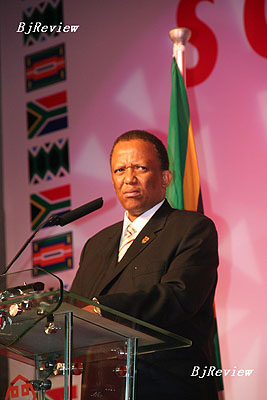
On April 27, 2007, South Africa celebrates its 13th year of independence. In a country alive with possibilities, where the segregated environment of the past is a constant reminder of the way forward, this is an important day. Beijing Review spoke to South African Ambassador Ndumiso Ntshinga about the ongoing move towards equality in the country and what Freedom Day means to South Africans.
Beijing Review: April 27 is celebrated as South African Freedom Day. What is the significance of this day to South Africans?
Ndumiso Ntshinga: It's called Freedom Day because this was the first time in our country's history that we became one people. As a nation, we come from a very segregated past and we never had a South African identity. In the past we were totally separated, into Africans, Asians, Colored and White. The African people were then separated into tribes, so there was nothing binding us as one country and invariably that kind of segregation leads to inequality in any society.
It also led to some having the right to vote and others not, so the April 27, 1994 was the first day in our history that we all had the right to vote as South Africans, regardless of our race or creed or gender.
It is a critically important day as this is when we started to build a collective identity and build a South Africa that is united and in which we could all share and be proud of.
During the past 13 years that the country has been a democracy, what measures have been put into place to realize and maintain
social equality?
We still have a lot of work to do before we can say we have social equality. However, giant strides have been taken. In the political sphere there is cohesion in that the institutions of democracy are in place and are very strong. This includes our parliament, judiciary, executive and organs for civil society. We have a very vibrant civil society. We have built a society that has checks and balances, for everyone in the country. On the political side very few countries have managed to do what we have done. [The South African Constitution is considered by many as one of the most advanced in the world, with a Bill of Rights second to none.]
However, other areas, like education, for example, still require much work. This is because the majority of the people are still disadvantaged. The majority of schools in townships and villages, for example, are still disadvantaged and these are very under resourced compared to formerly white-owned schools in the urban areas. But the majority of the children are still in these underprivileged schools, and this is reflected in exam results, where the formally white advantaged schools produce better results than the disadvantaged schools.
So, because the formerly disadvantaged people were denied a formal education, most of them are not skilled [90 percent are black], with the result that they are not able to participate in the economy of the country. This situation will only improve with empowerment and acquiring skills.
Our biggest problem in South Africa is not the failing of the economy to create jobs, but I think the major problem is the unavailability of skills to take the available jobs on offer.
That is a big challenge as these unskilled people are the majority and find it hard to get absorbed into the mainstream of the economy. As a result we find two economies [in the country]: a first economy and a second economy. The majority of people remain in this second economy due to lack of skills, and they work in the informal sector as street vendors. The government has therefore set up the Joint Initiative on Priority Skills Acquisition (JIPSA) program as part of our group strategy aimed at improving skills to make these people employable, especially young people. [In this way they will] eventually move into the first economy.
The majority of the listed companies on the South African stock exchange are traditionally white-owned and although we are starting to see a shift, still less than 10 percent of companies on our stock exchange are black-owned.
The government therefore found the need to try to assist with black empowerment so that blacks can enter the mainstream of the economy and have a share in it. These are some of the difficulties and strategies we are dealing with in facing inequality.
Chinese President Hu Jintao visited South Africa in February 2007. How did South Africans see this visit and how was he received in South Africa?
The visit has provoked the interest of South Africans who are now becoming aware of the world outside their country, a world other than Europe and the U.S.A. In South Africa, we have traditionally been inclined towards the U.S.A. and Western Europe as these have been our connections in the past. We have not known much about the East and Asia. With President Hu's visit this year and our President Mbeki coming to China late last year, it has made a lot of South Africans look at China. The consequence of high profile visits mean a number of South African businesses are looking to China for business opportunities or looking at China for possible partnerships. Even academia is beginning to look at China for academic partnerships.
| 